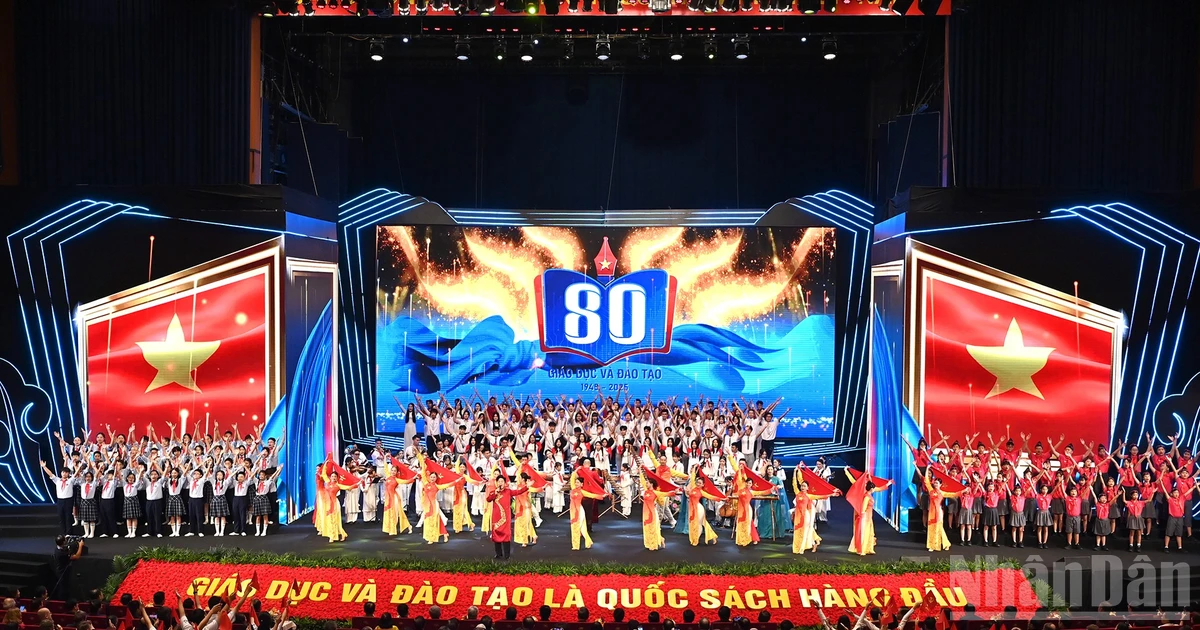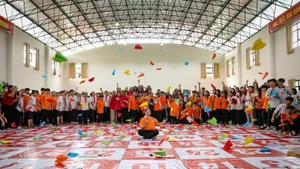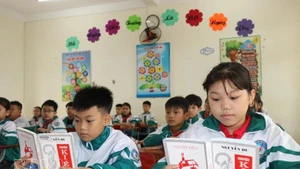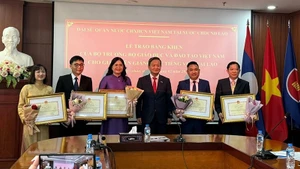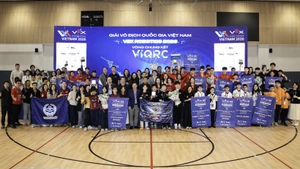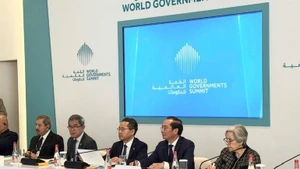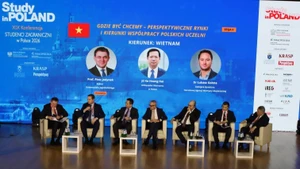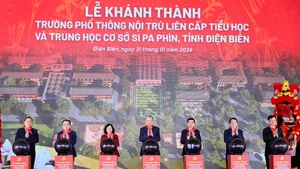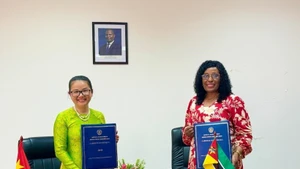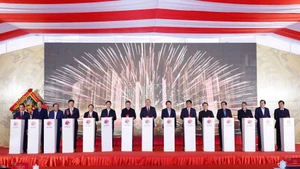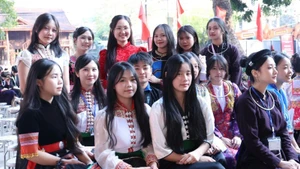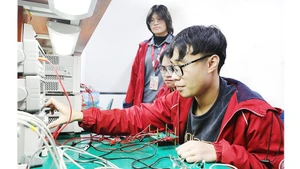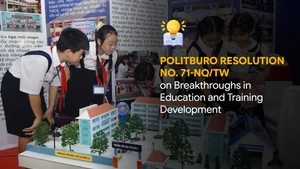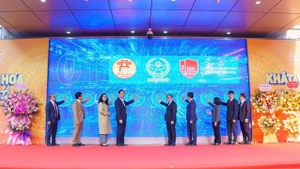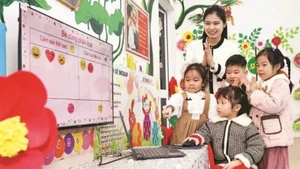A special academic year
According to the Ministry of Education and Training, 1.6 million teachers and 26 million students and learners across the country attended the opening ceremony of the 2025-2026 academic year.
The opening ceremony was held in conjunction with the celebration of the 80th anniversary of the establishment of the Ministry of National Education (now the Ministry of Education and Training). The event took place from 8:00 to 9:30 a.m. on September 5, organised directly at the National Convention Centre (Ha Noi) and connected online to all educational institutions from preschool to university (public and non-public) nationwide. It spread awareness of the glorious history of the education sector, promoted innovation and creativity, and called for an effective, high-quality academic year.
The Ministry of Education and Training stated that, for the first time, teachers, pupils, and students at all educational institutions nationwide would salute the flag and sing the National Anthem simultaneously during the opening ceremony.
The 2025-2026 academic year carries special significance, coinciding with the implementation of the two-tier local government model. It is also the first year in implementing the resolution of the 14th National Party Congress and the National Assembly’s resolution on the 2026-2030 socio-economic development plan.
This academic year also marks the first nationwide implementation of the resolution of the Politburo on breakthroughs in education and training development; the Teachers’ Law; the National Assembly’s resolution on tuition exemption and support for preschool children, general education students, and learners within the national education system; and the resolution on universalising preschool education for children aged 3 to 5.
To effectively implement the Party and state’s policies on education and training and achieve set objectives, the education sector has defined the theme for the 2025-2026 academic year as “Discipline – Innovation – Breakthrough – Development”.
Many opportunities for innovation and breakthrough
Speaking about the opportunities and challenges for the education sector right before the new school year, Minister of Education and Training Nguyen Kim Son stated: “This academic year, the education sector is facing unprecedented opportunities. Never before has the education and training sector received such attention and expectation from the Party and state as it does now.”
Resolution 71-NQ/TW of the Politburo on breakthroughs in education and training development was issued on the occasion of the 80th anniversary of National Day, the 80th anniversary of the education sector’s tradition, and the 80th anniversary of the establishment of the Ministry of National Education (now the Ministry of Education and Training). It reaffirms the Party’s special concern for education and training; asserts that education is always a decisive factor for the nation’s development; and demonstrates the consistent viewpoint that education and training are top national priorities, determining the nation’s future.
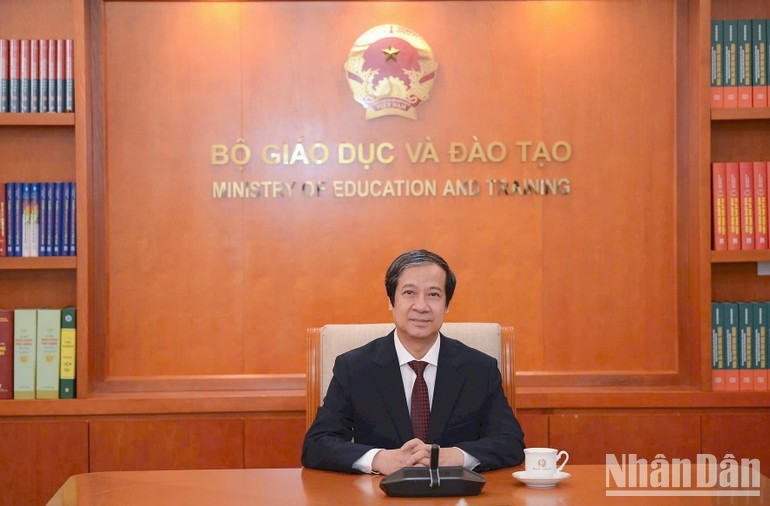
Minister Nguyen Kim Son emphasised that the resolution reflects the Party’s new vision and strategy for the future of the education system, especially at a time when the world is undergoing profound and comprehensive changes, with digital technology and artificial intelligence reshaping education globally. Furthermore, the resolution identifies major goals along with breakthrough tasks and solutions to reform and elevate Viet Nam’s education system.
This political foundation strongly propels the comprehensive and fundamental reform of education established by Resolution 29-NQ/TW, further reinforced by Conclusion 91-KL/TW.
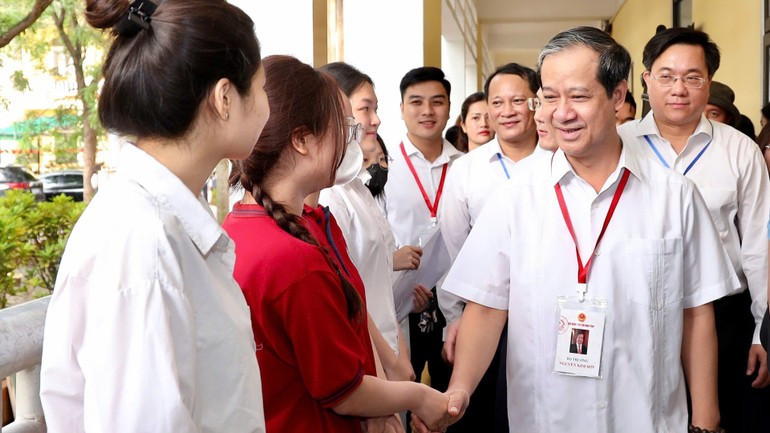
At the same time, a national target programme for education and training development is being drafted. Four important laws on education — the Teachers’ Law, the Law on Education, the Law on Higher Education, and the amended Law on Vocational Education — have been or are expected to be promulgated this year. These will provide a solid foundation for operating a modern, synchronised, and effective education system. Digital transformation, the application of artificial intelligence (AI), and STEM education are also expanding opportunities for Viet Nam’s education sector to improve quality and innovate comprehensively.
“For the education sector, this is a major opportunity to break through and affirm the decisive role of education in the country’s development,” the Minister affirmed.
Alongside opportunities, according to Minister Nguyen Kim Son, the sector also faces many challenges: operating under the two-tier local government model demands high requirements for managing organisational and personnel changes; issues of educational equity, private tutoring, teacher recruitment, and rotation must be solved decisively.
“The 2025-2026 academic year is extremely important, with many major tasks to carry out and many opportunities for reform and breakthroughs. The keyword of this school year is ‘implementation’ — focusing on effectively implementing the Party’s policies, state laws on education, as well as the 10 key tasks and solutions for the 2025-2026 academic year as set by the education sector.
This is how the sector can both inherit and promote achievements over the past 80 years, overcome existing shortcomings, and open new paths for Viet Nam’s education in the future,” the Minister conveyed, while sharing a message with teachers and students nationwide that: “Education is a century-long endeavour that requires vision, perseverance, fairness, and the highest sense of responsibility. I call on the entire sector — from management to teachers and staff, along with all pupils and students — to prepare the best mindset, spirit, and conditions, to unite and work together so that the new academic year will be busy but full of joy and success.”
The 80-year journey of education in national development
1945-1954: Immediately after the success of the August Revolution, the Ministry of National Education was established (August 28, 1945) with the mission of building an entirely new education system — by the people, of the people, and for the people. Remarkable achievements during this period included the Literacy Campaign and the Supplementary Education programme, eradicating illiteracy for millions and raising public knowledge. Schools were continuously expanded to train key human resources for the cause of “resistance and nation-building”.
1954-1975: The North basically eliminated illiteracy. Tens of thousands of cadres, intellectuals, engineers, doctors, and teachers were trained domestically and sent to socialist countries for study, becoming the main force to build the North and support the South. In the South, in liberated areas, revolutionary education demonstrated flexibility and resilience, establishing democratic schools and training cadres to serve the resistance.
1975-1986: The most outstanding achievement of this period was the successful unification of the national education system. The network of schools from preschool to university was maintained and expanded; illiteracy eradication and knowledge improvement succeeded. This was also the period of building comprehensive educational guidelines and policies, which became guiding principles for the sector’s long-term operations.
From 1986 to present: Educational policies and laws have been continuously improved, clearly expressing the viewpoint that “education and training are top national priorities”. Resolution 29-NQ/TW (issued on November 4, 2013) defined fundamental and comprehensive reforms in education and training, shifting from mainly providing knowledge to developing learners’ qualities and competencies. The 2018 General Education Curriculum marked a major shift in implementing this reform. Viet Nam’s education achievements, including universalisation, have been recognised and highly appreciated by the international community. The school network has been improved; educational equity has been ensured; resources for education have been maintained at high levels; many universities have appeared on prestigious international rankings; international cooperation has expanded; and information technology application and digital transformation have been strongly promoted.
